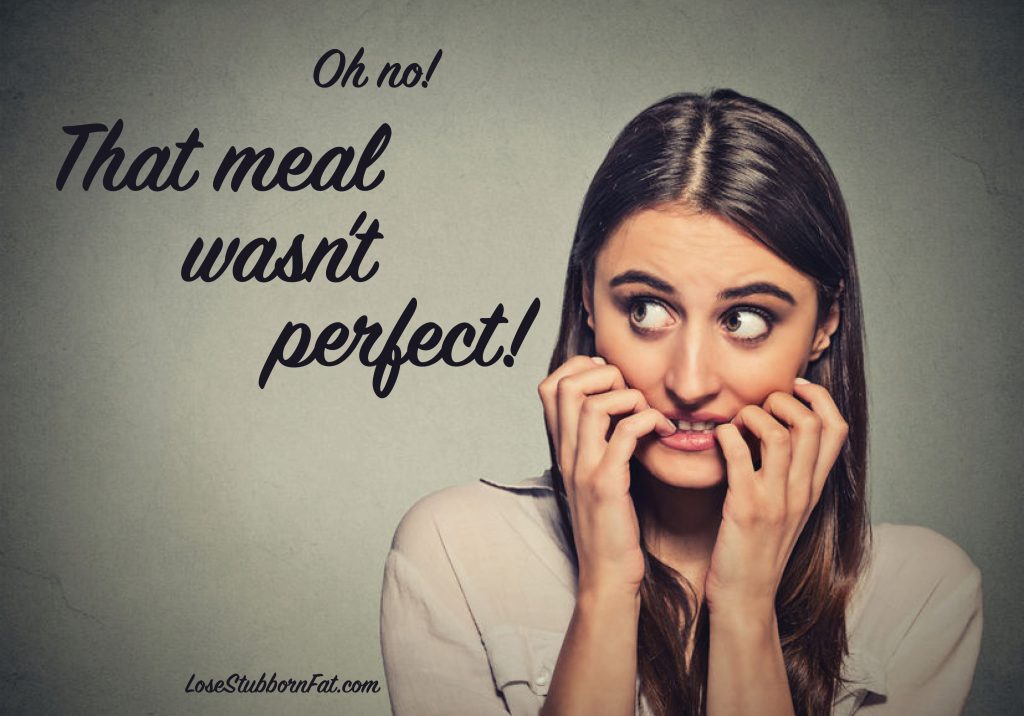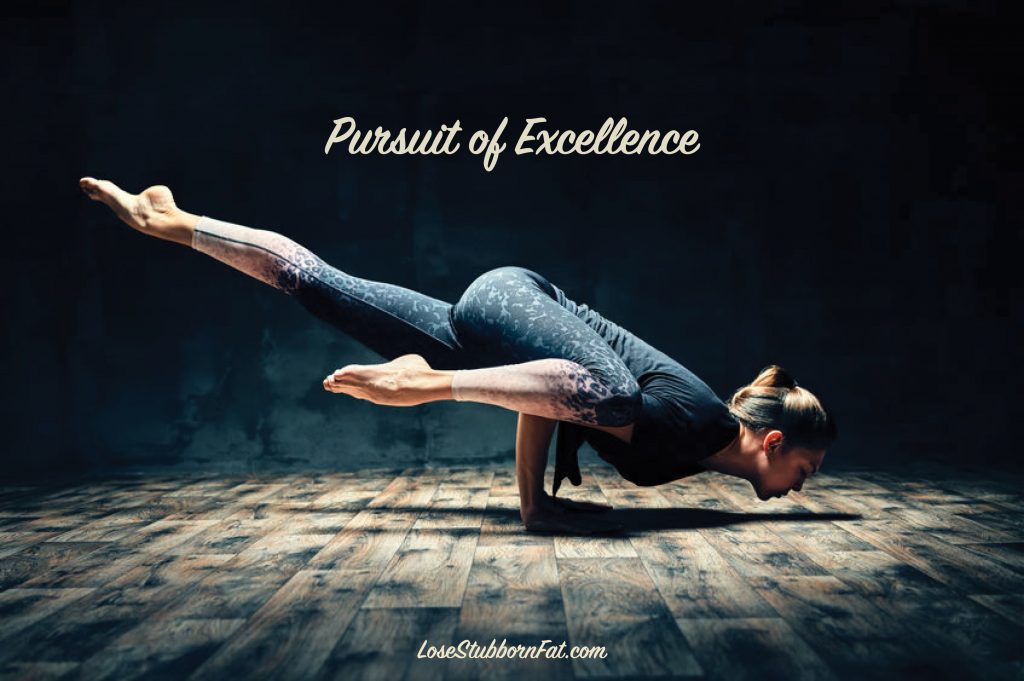
We’re often told that we have two choices:
- Be perfect on our diet
- Abject failure. Total free for all. The world explodes.
It’s kinda weird, because diet perfectionism is virtually indistinguishable from disordered eating. Also, we know that it isn’t effective — in the long term it actually predicts weight gain. And lastly, we know that it ruins our relationship with both our bodies and with food.
And yet, the diet industry keeps telling us that perfectionism is required. We’ve had perfectionist thoughts about diet drilled into our heads for years, from diet books, fitness magazines, and social media influencers. They all tell us that the opposite of diet perfectionism is failure.
They’re all wrong.
Pursuit of Excellence
The first opposite of perfectionism is pursuit of excellence.
- Perfectionism says, “If I mess up, I should quit.”
- Pursuit of excellence says, “If I mess up, I should practice more.”
Perfectionism is really the practice of quitting. It’s quitting to start again tomorrow. Quitting to start again on Monday. Quitting to start again next month. Quitting to start again at New Years. Perfectionism is just an excuse to quit a lot.
Pursuit of excellence is the path that we’ve taken to learn literally anything hard we’ve ever learned in our lives. If we learned an instrument, we made mistakes while we were learning, but we kept practicing. If we played a sport, we made mistakes while we were learning, but kept practicing. If we learned how to drive, we made mistakes while we were learning, but kept practicing.
Eating skills are a better fit for practice, because all skills are learned through practice. Leaning an instrument is a lot like learning to notice when you’re full, and stop. Learning to drive is a lot like learning to put your fork down between bites. Learning a kettlebell swing is like learning to check in with yourself before having a snack.
Making mistakes is part of practice. And sustained practice is the pursuit of excellence.
Different ways pursuit of excellence could look:
- Make a mistake, and keep practicing.
- Make a mistake, reflect on what to learn, and keep practicing
- Make a mistake, read more about how to practice better, and keep practicing
- Make a mistake, get coaching on how to practice better, and keep practicing
All of those are appropriate at different times. Or some combination of the above. The recurring theme though, is to keep practicing. Again, perfectionism is quitting. Pursuit of excellence is practicing, making mistakes, and practicing more.
Self-Compassion
Self-compassion is often a really hard practice. In a world that tells us we should be perfect robots, it’s hard to be with our own humanity. Self-compassion has three parts:
- Being with our own humanness and imperfection
- Allowing ourselves to feel our feelings
- Taking action on what matters to us and what takes care of us (even in the presence of our own imperfection and hard feelings)
We’ve been told that if we feel the feels, we can’t take action or be successful in that action. It’s a really, really antiquated notion, and it’s years behind modern psychology. We can totally take action on what matters to us, even while feeling our feelings.
Paradoxically, we’re often significantly more effective at taking action on what matters to us, when we allow ourselves to feel our feelings. For example: Emotional eating is just eating to not feel our feelings. It’s not a food issue, it’s a feeling our feelings issue.
Social media tells us we need to be perfect. That we need to be happy all of the time. It creates a superstition that we need to be happy and perfect before we take action on what matters to us.
Self-compassion is doing the things that matter to us, and doing the things that take care of us… just because they matter and take care of us.
You learn to be with your feelings because it takes care of you. You eat a balanced meal because it takes care of you. You put your fork down between bites because it takes care of you. You reflect on your values because it takes care of you.
You reflect on your values because you want to be clear about what matters to you. You obstacle plan your next week because your eating skills practice matters to you. You practice distinguishing perfectionism from self-compassion, because your relationship to your body matters to you.
If the focus is on doing what matters to us, it’s ok to make a mistake and then come back to doing what matters to us. If the focus is on taking care of ourselves, it’s ok to have hard feelings or be imperfect, and keeping taking care of ourselves

Pursuit of Excellence and Self-Compassion are More Effective
Allowing yourself to be an imperfect human, and continuing to practice eating skills anyway, is the most effective path to your goals.
As meta as this is, in a post that’s essentially just about practicing more — pursuit of excellence and self-compassion take practice.
The practice is noticing perfectionist diet thoughts, and letting them come and go in their own time. Notice them for what they are, label them, and don’t take action on them.
You don’t need to make perfectionist thoughts go away (good luck with that!) You just need to not act on them.
It’s a super simple (not easy) three-step process:
- Notice a diet perfectionist thought
- Label it a “diet perfectionist thought,” and let it be
- Continue practicing your eating skills
Rinse and repeat. That’s your practice.
It’s a hard practice, but it’s worth it. The pursuit of excellence is the path to mastery in eating skills. Self-compassion is the path to a better relationship with your body and with food. Both are totally, totally worth the effort.
Josh Hillis
Author of Lean & Strong: Eating Skills, Psychology, and Workouts
Creator and Head Coach: GMB Eating Skills
DBT for mindful eating. I love it! Also, Marc Brackett has a great book out called “Permission to Feel”. I highly recommend it! Great article!
Definitely has a lot in common with DBT for mindful eating!!!!! Most of what I do is ACT-based, which shares a lot of features with DBT. Ooooh, I’ll checkout that book!
Fantastic article–reading about this very topic in Lean & Strong has propelled me to the next level. I used to put my skills on a habit tracker and go all-or-nothing: even if I did great things all day long, but forgot to practice “fork down” or whatever at just one meal, then the whole day was shot. I’m a life-long PERFECTIONIST. But now I’m counting the NUMBER of times I practice the skill each day and I don’t beat myself up about the number, I just think YAY I practiced x more times!! This tiny change, along with creating a personalized good/better/best matrix (also from the book) has completely changed the way I feel about me. Don’t tell Josh, but the scale needle is moving again–I dropped 2 pounds last week despite eating amazing homemade waffles to celebrate Mother’s Day. How? By stopping all the quitting 🙂
Wow, that’s so awesome Susan!!!!! And, totally not just you — so many of us turned habits into another pass/fail thing. It sounds like you’re doing awsome with just number of times and good/better/best. I’m so so so stoked you like the book, and that you’re doing so well! And, of course you’re getting the results you want, you’ve totally reframed your practice and are practicing significantly more. It’s super cool to hear, and I so totally appreciate all of the work you’re putting in!
Josh, this is so good it is ridiculous. On point coach.
Thanks so much Shane!!!!!!